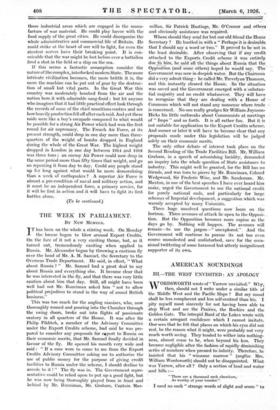THE WEEK IN PARLIAMENT
BY NEW MEMBER.
IT has been on the whole a stirring week. On Monday the breeze began to blow around Export Credits. On the face of it not a very exciting theme, but, as it turned out, tremendously exciting when applied to Russia. Mr. Alexander began by throwing a cautious fly over the head of Mr. A. M. Samuel, the Secretary to the Overseas Trade Department. He said, in effect, " What about Russia ? " Mr. Samuel had a great deal to say about Russia and everything else. It became clear that he was interested in the fly, and that there was very little caution about him that day. Still, all might have been well had not Mr. Runciman asked him " not to allow political prejudices to stand in the way of sound British business."
This was too much for the angling maniacs, who, now thoroughly roused and pouring into the Chamber through the swing doors, broke out into flights of passionate oratory in all quarters of the House. It was after Sir Philip Pilditch, a member of the Advisory Committee under the Export Credits scheme, had said he was pre- pared to consider any proposals for eiport to Russia on their economic merits, that Mr. Samuel finally decided in favour of the fly. He opened his mouth- very wide and said : " If a case were to come to me from the Export Credits Advisory Committee asking me to authorize the use of public money for the purpose of giving credit facilities to Russia under the scheme, I should decline to accede to it ! " The fly was in. The Government repre- sentative could be relied upon to put up a good fight, tut he was now being thoroughly played from in front and behind by Mr. Runciman, Mr. Graham, Captain Mao- millan, Sir Patrick Hastings, Mr. O'Connor and others and obviously "assistance was required.
Whom should they send for but our old friend the Home Secretary? He bustled in withra " Perhaps-it is desirable that I should say a word or two." It proved to be not in the least desirable. After observing that- if any credit attached to the EXports _Credit scheme it was entirely due to him, he said all the things abOut Russia that the Opposition (and- some others) hoped he would say. The Government was now in deepish water: But the Chairrnan did a very adroit thing he called Mr. Trevelyan Thomson, and this instantly cleared. the IlOuie. :So- the situation was saved and the Government emerged with a -substan- tial majority and no credit Whatsoever. They Will have to recognize that they • are dealing with a House- of Commons which will not stand any nonsense where trade is concerned.- No one really grudges Sir William Joynson- Hicks his little outbreaks about Communists at meetings of " Imps " and so forth. It is -all rather fun. But it is not suitable-for application to the Export Credits scheme. And sooner or later-it will have to become clear that any proposals made under this legislation will be judged solely- on their economic merits.
The only other debate of interest took place on the. Second Iteadinz_of the Trade Facilities. Bill. Mr, William Graham, in a: speech of astonishing lucidity, demanded an inquiry into the whole question of State assistance to- industry. This might well be granted, for the Bill has no friends, and was torn.to pieces by Mr. Runciman, Colonel Wedgwood, Sir Frederic Wise, and Mr. Sandman. Mr. Maxton, in one of the best speeches I.have ever heard him make, _urged the Government to use the national credit for purely national ends, and particularly for large schemes of Imperial development, a suggestion, which was warmly accepted, by many Unionists. Three huge unsolved questions now loom on the horizon. Three avenues of attack lie open to.the tion. But the Opposition becomes more supine as the days go by. Nothing will happen. . The avenues will', remain—to use the jargon—" unexplored." . And the Government will continue to pursue its not too even course unmolested and undisturbed, save for. the occa- sional twittering of some harassed but utterly insignificant supporter of its. own.






































































 Previous page
Previous page